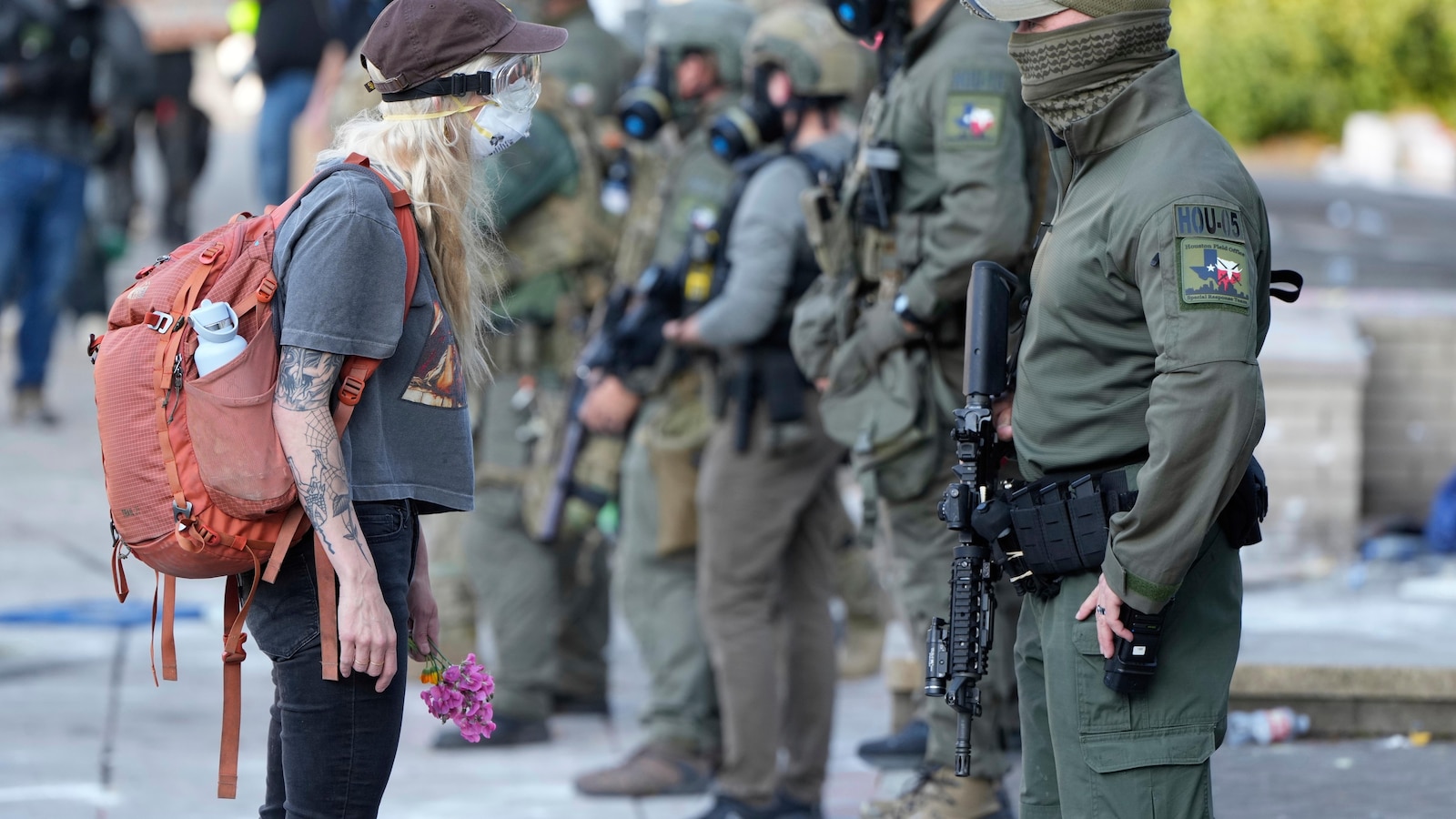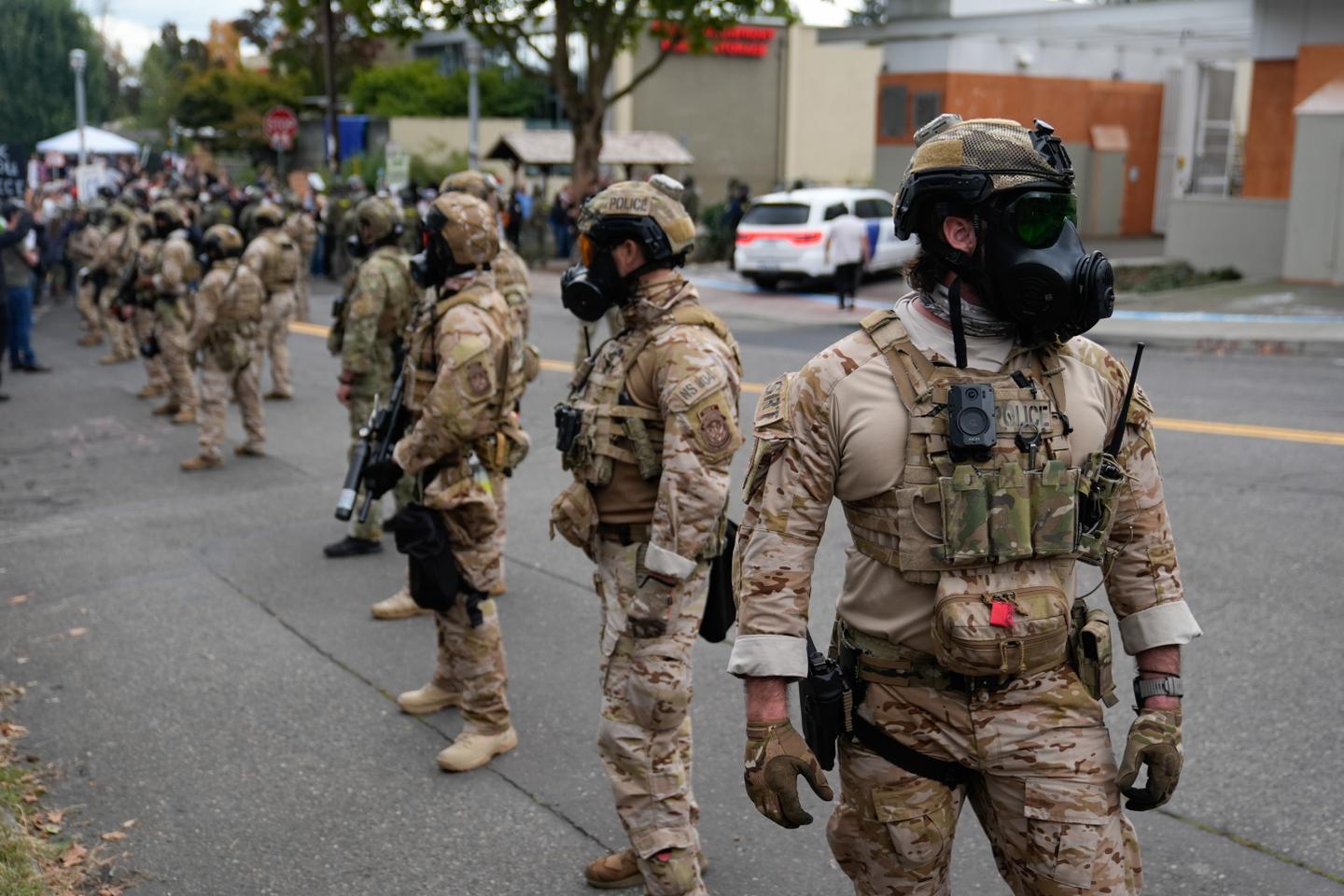President Trump said on Monday he would consider invoking the Insurrection Act — an 1807 law that grants the president emergency powers to deploy troops on U.S. soil — as a way to “get around” recent court rulings that have blocked his efforts to deploy the National Guard in major American cities.
In an appearance on the right-wing cable network Newsmax Monday evening, Mr. Trump said that he saw the Insurrection Act as “a way to get around” the opposition to the deployments, but did not commit to invoking the law. “If we don’t have to use it,” he said, “I wouldn’t use it.”
In an appearance in the Oval Office in the afternoon, Mr. Trump was asked under what circumstances he would exercise those emergency powers. Mr. Trump replied that “we have an Insurrection Act for a reason,” and “I’d do it if it were necessary, but so far it hasn’t been necessary.” He laid out a set of conditions that he said could justify invoking the act, including “if people were being killed and courts were holding us up, or mayors or governors were holding us up.”
In Mr. Trump’s worldview, at least some of those conditions have already been met. Mr. Trump has described Portland, Ore., one of the cities he has targeted for National Guard deployments, as “on fire for years,” adding “I think that’s all insurrection, really criminal insurrection.”
Democratic officials have resisted the National Guard deployments, most prominently Gov. JB Pritzker of Illinois. On Monday, Mr. Pritzker accused the president of causing chaos and confusion to create a “pretext for invoking the Insurrection Act so that he can send the military to our city.”
Mr. Trump’s remarks came after two court rulings over the weekend blocked the Trump administration from deploying hundreds of out-of-state National Guard troops to Oregon. Judge Karin Immergut, an appointee of Mr. Trump’s, initially blocked his deployment of military forces on Saturday and then broadened her restraining order on Sunday after Mr. Trump tried to sidestep it, telling Justice Department lawyers that the president had been “in direct contravention” of her order.
Generally, the Insurrection Act gives the president the power to send military forces to states to quell widespread public unrest and to support civilian law enforcement agencies. Before invoking it, the president must first call for the “insurgents” to disperse, according to a Congressional Research Service report published in 2006. If stability is not restored, the president may then issue an executive order to deploy troops
Mr. Trump has raised the idea of deploying the military for domestic law enforcement since his first term. The Insurrection Act has not been invoked for more than 30 years, and Mr. Trump’s use of the emergency powers for routine law enforcement would carry profound implications for civil liberties and for the traditional constraints on federal power.
The law typically forbids the use of the military as a domestic police force.
But the Insurrection Act authorizes the president to use the military to suppress an insurrection if a state government requests it. And there is some leeway in the president’s discretion, such as whether the commander in chief considers that the unrest is obstructing laws of the United States. Both Mr. Trump and Stephen Miller, a senior aide to the president, have invoked the term “insurrection” in remarks justifying the National Guard deployments.
The last time that the act was used was in 1992, when riots in Los Angeles broke out after four white police officers were acquitted in the beating of Rodney King, a Black motorist. Armed forces have also been used to quell civil disturbances after natural disasters, as with widespread looting in St. Croix, in the U.S. Virgin Islands, after Hurricane Hugo in 1989, according to the Congressional Research Service report.
But the current situation in Chicago, Portland and other cities is a far cry from the general lawlessness that precipitated those emergencies. Even as Mr. Trump describes Chicago in near-apocalyptic language, the murder rate in the city has fallen significantly so far in 2025, with 319 homicides recorded for the year through the end of September — down by nearly half compared with the height of the pandemic. Even so, Mr. Trump asserted on Monday that it’s “probably worse than almost any city in the world” and that even Taliban-ruled Afghanistan would “marvel at how much crime we have.”
[SRC] https://www.nytimes.com/live/2025/10/06/us/national-guard-trump-oregon-chicago
 Visit the website
Visit the website




